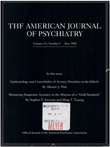Association of beta-endorphin with specific clinical symptoms of depression
Abstract
OBJECTIVE: Abnormalities in plasma concentrations of beta-endorphin- like immunoreactivity (beta-endorphin) have been reported in depressed patients. This study was done to test the hypothesis that specific clinical characteristics of depression are associated with plasma beta- endorphin concentration. METHOD: Plasma beta-endorphin was evaluated in 20 depressed patients diagnosed according to DSM-III-R and in 23 age- and sex-matched comparison subjects, and each was evaluated with the structured Schedule for Affective Disorders and Schizophrenia (SADS). Twelve SADS items involving dysphoric mood and related symptoms were chosen for analysis. RESULTS: Within the group of all 43 subjects and within the depressed group, beta-endorphin level correlated significantly with psychic anxiety and with phobia. In the depressed group only, beta-endorphin also correlated significantly with obsessions/compulsions. Concentration of beta-endorphin was not significantly correlated with score on the Hamilton Rating Scale for Depression or Beck Depression Inventory or with scores on other SADS symptom items, including somatic anxiety, insomnia, subjective anger, overt anger, agitation, psychomotor retardation, panic attacks, appetite loss, or total weight loss. In the group of 23 comparison subjects, beta-endorphin did not correlate with Beck or Hamilton depression score or with any of the SADS clinical variables. CONCLUSIONS: High levels of plasma beta-endorphin may be associated with more severe anxiety, phobia, and obsessions/compulsions in depressed patients.
Access content
To read the fulltext, please use one of the options below to sign in or purchase access.- Personal login
- Institutional Login
- Sign in via OpenAthens
- Register for access
-
Please login/register if you wish to pair your device and check access availability.
Not a subscriber?
PsychiatryOnline subscription options offer access to the DSM-5 library, books, journals, CME, and patient resources. This all-in-one virtual library provides psychiatrists and mental health professionals with key resources for diagnosis, treatment, research, and professional development.
Need more help? PsychiatryOnline Customer Service may be reached by emailing [email protected] or by calling 800-368-5777 (in the U.S.) or 703-907-7322 (outside the U.S.).



